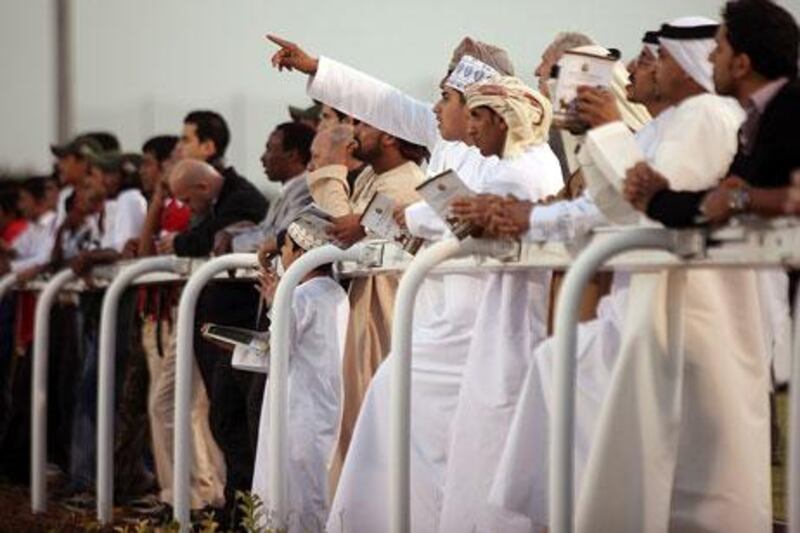The real action at the President of the UAE Cup races - and probably races all over the world - takes place before the races themselves.
This is when the science of prediction is at its most forceful and attractive. My guide at the Abu Dhabi Equestrian Club, for the biggest meeting on the Abu Dhabi calendar, is a bit of a local don at the predictions business.
There is form to look at, and pedigree as well, which is a little classist but that matters more for horses than it does for humans.
Then what kind of natural racer the horse is: is it a hold-up, who is happy to stay in the middle or at the back, until the time is right for the push, or a front-runner who sets the pace throughout.
Then weigh up the jockey, the trainer and then little things like whether the horse wears blinkers, or a nose band (to keep the heads down of those horses who naturally hold their heads high) and from these combinations, take a crack.
My guide is to end the night having predicted three winners from the seven races; an accomplice ends up predicting four.
In the stands, Abdul-Rahman Osman, who has been coming to the races for 12 years, is also at it with the predictions. He is clearly the one obligatory celebrity fan all sports seem to have cultivated recently, bedecked in a customary tall hat, robed in the colours of the UAE flag and with many, many badges of the flag and the rulers ("I'm dressed up because this is the biggest race of the season," he offered as explanation).
He is, as usually are many in the stands, originally from Sudan, where horse racing is also a well-developed, thriving scene. It is, along with football says another watcher, Magdi Osman Mohammad, what the British left behind as legacy.
Both Magdi and Abdul-Rahman predicted a couple of winners.
"I go by the family first and then recent results," said Magdi. "I know a good horse."
He is also to end with three winners but like everyone else, the fans, my guide and the accomplice (and Pat Buckley, the racing manager at the Abu Dhabi Equestrian Club), he tips the wrong winner for the main race of the day, The President of the UAE Cup, at Dh1 million, the richest race in the country for purebred Arabians.
On paper, Seraphin Du Paon, the six-year-old chestnut horse, should have won the race. After all, he had won the two biggest races last season, including this race and the Kahayla Classic at the Dubai World Cup. He also won the prep race for this last month. He comes from impeccable breed.
His jockey, Mirco Demuro, had won the evening's first two races and is the 2011 Dubai World Cup-winning jockey.
And for much of the latter half of the race, as he made an elegant move towards the front, he looked like he would. But in a wonderfully close finish - and the collective sound of horses hurtling past the winning post should only be seen and felt live, not described - the six-year-old Nieshan burst through at the very end and pipped him by a neck. It was a close enough thing, but with predictions, you're right or wrong or nowhere.
Still Nieshan's win at least kept it in the family, the winner and runners-up being half-brothers from the same father (Akbar). Buckley, to be fair, had warned, "Nieshan will run very well," in what he called, "one of the best fields we've ever had for the race".
But only one man, who shall remain unidentified, had actually tipped Nieshan beforehand.
"The target was not the prep race, the target was here," he said of Seraphin Du Paon's earlier win and form. "Nieshan had won his last race by taking a drop in class with not so good horses to give him confidence, so I thought he'd do well here. It worked."
It also turned out, as Gerald Avranche, the winning jockey, said later, the slow pace of the race ultimately helped him and hampered Seraphin Du Paon. All of which leads to the conclusion that whatever you ultimately factor into the predictions, you're likely not to have factored in enough.





